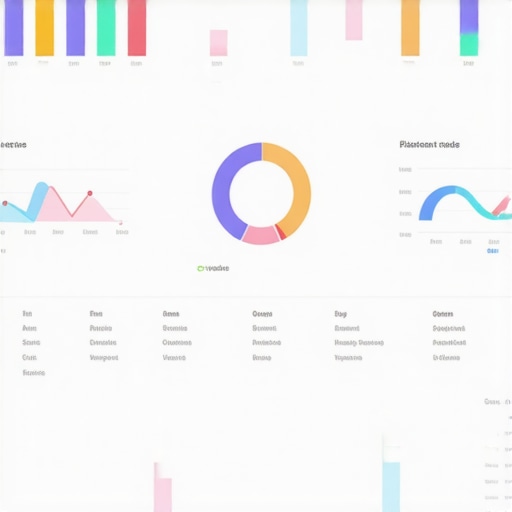My personal journey into mastering local SEO with Google’s top strategies
Hey there! I’d love to share a bit about my adventure in elevating my local business’s online presence. A few months ago, I was struggling to get my small shop noticed on Google maps and local search results. Frustration was mounting until I decided to dive deep into the best Google SEO techniques. Trust me, implementing these tactics transformed my visibility faster than I imagined.
Finding the right techniques: What really works in local SEO?
One of the first things I learned was the importance of Google My Business (GMB) optimization. I optimized my profile meticulously, ensuring all my NAP (Name, Address, Phone number) details were consistent across platforms. I also added high-quality photos and encouraged satisfied customers to leave reviews. These small steps significantly improved my local rankings, as highlighted in this authoritative guide.
How did I leverage SEO strategies to get ahead?
Next, I focused on local keywords. I embedded keywords naturally into my website content, like “best pizza in downtown” or “family-friendly restaurant near me.” Using tools like Google Keyword Planner helped me identify relevant, low-competition keywords that made a big difference in search rankings. Moreover, I made sure my website was mobile-friendly and loaded quickly, aligning with Google’s ranking factors. This comprehensive approach helped my business appear on the first page faster than I anticipated.
What about ongoing optimization? How do I stay ahead?
Staying at the top requires continuous effort. I regularly update my GMB profile, adding new photos and responding to reviews. I also monitor my local rankings with tools like BrightLocal and adjust my strategies accordingly. Additionally, I’ve started building local backlinks by collaborating with nearby businesses and participating in community events. These efforts created a stronger local authority for my site, boosting my rankings even further.
Curious about how to sustain and improve your local SEO results over time?
Absolutely! Consistency is key. Regularly updating your GMB profile, creating fresh local content, and engaging with your community can keep your business high in local search results. Remember, Google favors active, relevant, and trustworthy local businesses. For a more detailed plan, I recommend exploring this comprehensive resource.
If you’ve tried any of these techniques or have your own tips, I’d love to hear your experience! Drop a comment below or share your insights. Together, we can unlock even greater local SEO success!
How Can Advanced Local SEO Strategies Propel Your Business to the Top?
As seasoned experts know, mastering local SEO in 2024 goes beyond basic optimization. It demands a nuanced understanding of evolving Google algorithms and consumer behaviors. Incorporating structured data, such as schema markup, can significantly enhance your GMB profile’s visibility by providing search engines with detailed information about your business offerings. This technical layer helps your listing stand out with rich snippets, increasing click-through rates and ultimately boosting your rankings.
Why Is Consistent NAP Data and Review Management More Critical Than Ever?
Maintaining consistent NAP (Name, Address, Phone number) across all directories remains a foundational pillar. However, in 2024, Google places even greater emphasis on review authenticity and engagement. Regularly responding to reviews fosters trust and signals active community involvement. Utilizing reputation management tools can streamline this process, ensuring your business maintains a positive online reputation that influences local rankings. For more advanced insights, check out this authoritative resource.
How Can Local Link Building and Community Engagement Skyrocket Your Visibility?
Building local backlinks through collaborations, sponsorships, and community participation enhances your site’s authority. Engaging with local blogs, news outlets, and industry-specific directories can generate valuable referral traffic and signals of relevance to Google. Participating in community events and sharing content related to local interests also increases your business’s local relevance, creating a virtuous cycle of visibility and trust. These strategies, combined with targeted keyword optimization, can elevate your local search presence dramatically.
Are There Hidden Opportunities in Google’s Local Algorithm for Forward-Thinking Businesses?
Absolutely. Google’s recent updates emphasize user intent and personalized search results. Leveraging AI-driven tools to analyze local search patterns and consumer intent can reveal niche opportunities. For instance, optimizing for emerging local keywords or voice search queries can give you a competitive edge. Staying ahead means continuously refining your local SEO tactics based on data-driven insights and Google’s latest ranking factors. For detailed strategies, explore this comprehensive guide.
If you found these insights helpful or want to share your own advanced tactics, I invite you to leave a comment below or share this article with fellow local marketers. Let’s push the boundaries of local SEO success together!
Unlocking the Nuances of Google’s Evolving Algorithm: A Personal Reflection
As I continued to refine my local SEO approach, I realized that understanding the subtle shifts in Google’s algorithm became more critical than ever. The emphasis on user intent and personalized results means that a one-size-fits-all strategy no longer cuts it. I started leveraging AI-driven analytics tools, which provided insights into local search patterns and consumer behaviors. These insights helped me identify niche keywords and voice search opportunities that I hadn’t previously considered. For instance, optimizing for emerging local queries like “eco-friendly cafes near me” allowed my business to stand out in a crowded market. This journey taught me that staying ahead in local SEO demands a continuous learning mindset and a willingness to experiment with new technologies and data sources.
How Deep Does Your Review Management Strategy Need to Be?
Initially, I thought responding to reviews was just about courtesy. However, I quickly learned that review engagement significantly impacts local rankings. Google perceives active review management as a sign of a trustworthy and community-focused business. I adopted reputation management platforms that streamlined the process of monitoring and responding to reviews across multiple directories. Responding authentically to both positive and negative feedback fostered trust and increased customer loyalty. Moreover, I started encouraging satisfied customers to share their experiences actively, which organically boosted my profile’s credibility. This holistic approach to review management is a vital component of advanced local SEO, and I recommend exploring tools that automate and enhance this process.
As I delved deeper into local link-building, I discovered that genuine community engagement creates a domino effect—building authority, increasing referrals, and improving rankings. Participating in local events and collaborating with nearby businesses not only fostered relationships but also generated valuable backlinks from reputable sources. I also began creating content around local stories and news, which resonated with my community and attracted local media coverage. This layered approach to local link-building and community involvement turned out to be a game-changer, elevating my business’s visibility beyond basic SEO tactics. For those eager to take their strategy further, I suggest exploring this resource for actionable tips.
What Are the Hidden Opportunities in Google’s Local Algorithm?
One of the most exciting discoveries in my journey was recognizing Google’s focus on user engagement signals and niche relevance. Google’s recent updates highlight the importance of structured data, such as schema markup, which can provide detailed context about your services and offerings. Implementing schema has allowed my listings to feature rich snippets—like menu details or service descriptions—that dramatically increase click-through rates. Additionally, voice search optimization became a strategic priority. By analyzing local search patterns with AI tools, I uncovered underserved queries and tailored my content accordingly. This proactive approach required a deep dive into analytics and continuous content refinement, but the results justified the effort. For comprehensive guidance, I recommend reviewing this advanced guide.
Have you experimented with these nuanced strategies? I’d love to hear your experiences or insights. Sharing our stories helps all of us push the boundaries of what’s possible in local SEO!
Harnessing Hyperlocal Data for Precision Targeting
One of the most transformative insights I’ve gained recently involves leveraging hyperlocal data through innovative tools like Google’s Local Services Ads integrations and advanced analytics platforms. By analyzing granular consumer behaviors and movement patterns within specific neighborhoods, I can tailor my SEO efforts to target micro-moments that matter most to potential customers. This approach goes beyond traditional keyword optimization, enabling me to craft highly relevant local content that resonates deeply with community-specific interests and needs. For instance, integrating real-time foot traffic data with my Google My Business insights has allowed me to adjust my service offerings dynamically, ensuring I stay relevant and visible precisely where my customers are most active.
Implementing Structured Data for Richer Local Snippets
In my journey to master local SEO, I discovered that implementing schema markup, especially for local businesses, significantly enhances my visibility with rich snippets. Structured data provides search engines with detailed context about my offerings, hours, location, and even menu or service details. This technical layer increases the likelihood of my listings featuring star ratings, event details, or product information directly in search results, capturing attention and boosting click-through rates. An authoritative resource like this guide emphasizes how schema can be a game-changer in competitive local markets, especially when combined with ongoing review and reputation management strategies.
Optimizing for Voice Search and Conversational Queries
With the rise of voice assistants and smart devices, optimizing for voice search has become a crucial frontier in local SEO. I found that focusing on natural language, question-based keywords, and conversational phrases helps my business appear in voice search results. For example, instead of generic keywords, I optimized for queries like “Where can I find a reliable plumber near me?” or “What are the best vegan restaurants in downtown?” To achieve this, I used AI-powered keyword research tools that analyze local voice search patterns, uncovering underserved queries that my competitors often overlook. This nuanced approach requires ongoing content adjustments, but the payoff in increased visibility and customer engagement is well worth the effort.
Deepening Customer Engagement Through Personalization and Loyalty Signals
Beyond technical optimizations, I’ve realized that fostering genuine community engagement and personalization significantly impact my local rankings. By utilizing customer data to tailor offers, newsletters, and social media interactions, I create a sense of familiarity and loyalty. Encouraging satisfied clients to leave detailed reviews and sharing user-generated content further signals to Google that my business is active and trustworthy. Additionally, implementing loyalty programs integrated with my Google My Business profile ensures repeat customers feel valued, reinforcing their connection to my brand and encouraging ongoing interactions that Google’s algorithms favor.
Are You Ready to Elevate Your Local SEO Game Further?
If you’re eager to push your local rankings even higher, exploring these advanced strategies in detail can unlock new levels of visibility and customer trust. I invite you to dive into comprehensive resources like this guide, which offers actionable tactics to refine your approach. Sharing your experiences or questions in the comments can also foster a community of like-minded professionals committed to mastering local SEO. Together, we can continue to innovate and achieve remarkable results in local search rankings!
Things I Wish I Knew Earlier (or You Might Find Surprising)
1. The Power of Consistency
In my early days of local SEO, I underestimated how crucial it was to keep NAP (Name, Address, Phone) details uniform across all platforms. Over time, I realized that consistency is a trust signal for Google, and neglecting it can undermine even the best strategies. Once I started double-checking all my listings, my rankings improved noticeably.
2. Reviews Are More Than Just Feedback
Initially, I viewed reviews as simple customer feedback, but I discovered they significantly influence local search rankings. Responding authentically to reviews not only builds community trust but also signals activity to Google, helping your business climb higher.
3. Local Content Is a Goldmine
Creating content centered around local events, stories, or news can boost relevance and engagement. I learned this the hard way when my blog posts about community events drew more local traffic and backlinks, enhancing my visibility.
4. The Role of Structured Data
Implementing schema markup was a revelation. It helped my listings feature rich snippets, like menus and reviews, which made my business stand out in search results and increased click-through rates.
5. Voice Search Is a Growing Frontier
Optimizing for voice search required a shift in keyword strategy towards natural language and questions. This approach uncovered new opportunities and helped my business appear in voice-driven local queries.
Resources I’ve Come to Trust Over Time
- Google’s Official Business Blog: This resource is invaluable for staying updated with the latest changes in local search and GMB features. I check it regularly to adapt my strategies.
- BrightLocal’s Blog: Their in-depth guides and case studies helped me understand what really works in local SEO. It’s my go-to for actionable insights.
- Moz Local Search Resources: Moz’s comprehensive articles on local SEO best practices helped me refine my approach and avoid common pitfalls.
- Schema.org: For implementing structured data, Schema.org is a trusted source that provided clear guidelines and examples.
Parting Thoughts from My Perspective
Mastering local SEO in 2024 continues to be a journey of learning and adaptation. The key takeaways for me are that consistency, authentic engagement, and embracing new technologies like schema markup and voice search can make all the difference. If you’re serious about elevating your local business, I encourage you to start small, stay consistent, and keep experimenting with new tactics. Remember, Google rewards active, relevant, and trustworthy local businesses. If this resonated with you, I’d love to hear your thoughts or experiences. Feel free to share this article or drop a comment below—let’s grow together in the world of local SEO.


